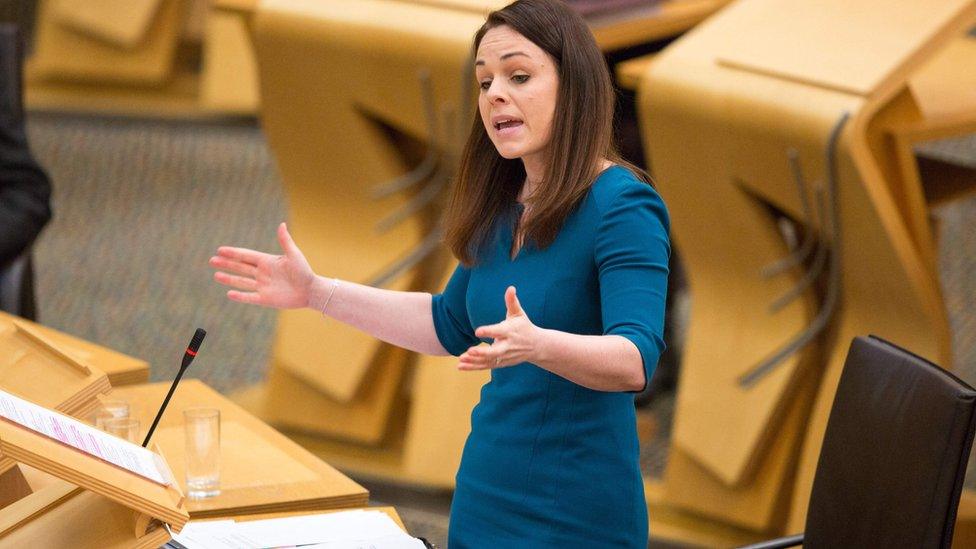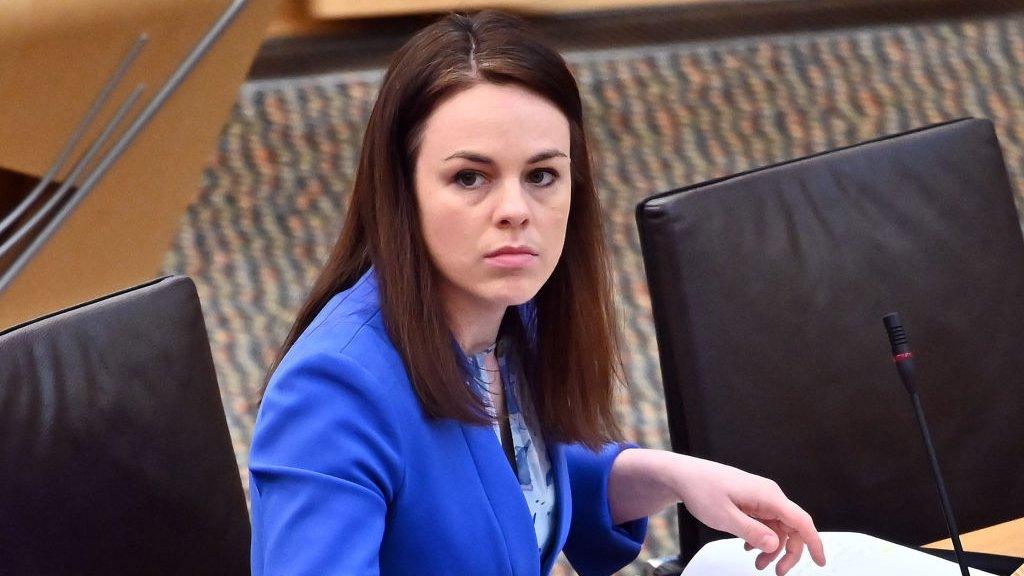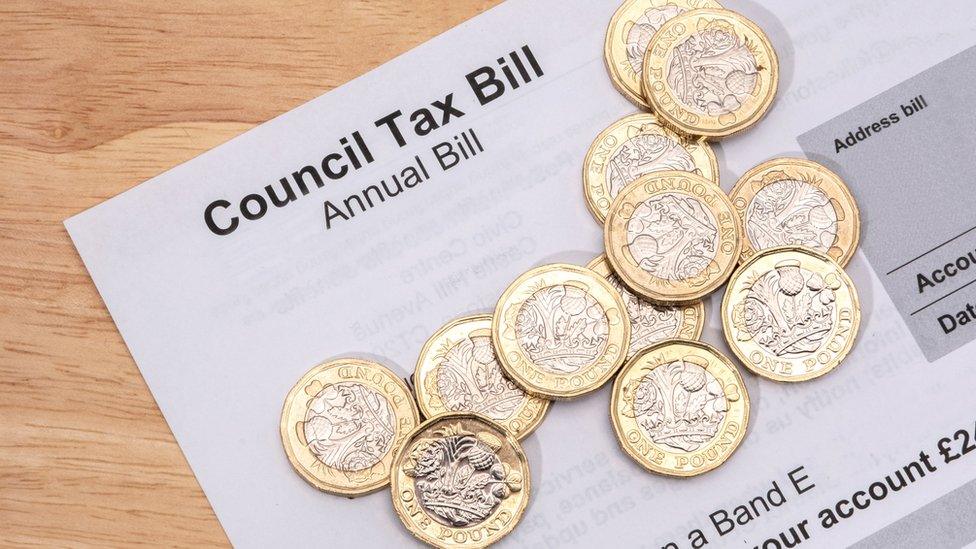Scottish income tax 2022-23 - What might you be paying?
- Published

The Scottish government's draft 2022-23 budget includes no material change to income tax rates and bands.
However, starter and basic rates will increase in line with inflation, while higher and top rates will remain at current levels.
What Finance Secretary Kate Forbes is proposing is only part of the picture for tax payers north of the border. Personal allowance and National Insurance are controlled by the UK Chancellor Rishi Sunak. And we already know he will make employees, employers and the self-employed pay 1.25 pence more in the pound for National Insurance (NI) from April 2022 to fund social care.
So, based on what Ms Forbes and Mr Sunak have announced, tax consultant Deloitte has put together examples spanning different salaries.
The lower earner
£15,000 salary
If you earn a salary of £15,000 in 2022/23 and have no other income, the personal allowance of £12,570 will be deducted and £2,430 will be taxable. If you are resident in Scotland, your income tax calculation will be as follows;
Scottish starter rate - £2,162 at 19%= £410.78
Scottish basic rate - £268 at 20% = £53.60
Total tax = £464.38
This is a decrease of 65p compared to 2021/22 due to the small increase in the starter band from £2,097 to £2,162. At this income level there is an increase in National Insurance of £26.56 compared to 2021/22, resulting in the overall tax increasing by £25.91.
If you earned the same sum of money but were not resident in Scotland the full £2,430 would be taxable at 20% (UK basic rate) producing an income tax bill of £486. Therefore, you would pay £21.62 less as a resident of Scotland.
The medium to higher earners
£33,000 salary
If you earn a salary of £33,000 in 2022/23 and have no other income, the personal allowance of £12,570 will be deducted and £20,430 will be taxable. If you are resident in Scotland, your income tax will be as follows;
Scottish starter rate - £2,162 at 19% = £410.78
Scottish basic rate - £10,956 at 20% = £2,191.20
Scottish intermediate rate - £7,312 at 21% = £1,535.52
Tax total = £4,137.50
This is a decrease of £4.57 compared to 2021/22 due to the small inflationary increases in the starter and basic rate bands. At this income level there is an increase in National Insurance of £251.56 compared to 2021/22, resulting in the overall tax increasing by £246.99.
If you were resident elsewhere in the UK, the full £20,430 would be taxable at 20%, giving an income tax liability of £4,086. A Scottish resident would pay an additional £51.50 in income tax compared with living elsewhere in the UK.
£50,000 salary
If you earn a salary of £50,000 in 2022/23 and have no other income £37,430 will be taxable after deduction of the £12,570 personal allowance. If you are resident in Scotland, the tax calculation will be as follows;
Scottish starter rate - £2,162 at 19% = £410.78
Scottish basic rate - £10,956 at 20% = £2,191.20
Scottish intermediate rate - £17,974 at 21% =£3,774.54
Scottish higher rate - £6,338 at 41%= £2,598.58
Total tax = £8,975.10
This is a decrease of £4.57 compared to 2021/22 due to the small inflationary increases in the starter and basic rate bands. At this income level there is an increase in National Insurance of £464.06 compared to 2021/22, resulting in the overall tax increasing by £459.49.
If you were not resident in Scotland, the full £37,430 will be taxable at 20% (UK basic rate) producing an income tax bill of £7,486. You would therefore be paying £1,489.10 more in tax as a resident of Scotland.
The higher earner
£200,000 salary
If you earn a salary of £200,000 in 2022/23 and have no other income you are not entitled to a personal allowance because your income exceeds £125,140. The taxable income is therefore £200,000. If you are a resident in Scotland, your income tax breaks down is as follows;
Scottish starter rate - £2,162 at 19% = £410.78
Scottish basic rate - £10,956 at 20% = £2,191.20
Scottish intermediate rate - £17,974 at 21% =£3,774.54
Scottish higher rate - £118,908 at 41% = £48,752.28
Scottish additional rate - £50,000 at 46% = £23,000
Total tax = £78,128.80
This is a decrease of £4.57 compared to 2021/22 due to small increases in the starter and basic rate bands.
If you are a resident elsewhere in the UK, on this salary you would pay £74,960 in tax - £3,168.80 less than north of the border.
Analysis - Income tax savings 'dwarfed' by NI increases
Douglas Farish, Tax Partner at Deloitte, external, said: "As expected, the Scottish government announced there will be no change to income tax rates, with starter and basic rate bands increasing at the same rate as inflation. The Scottish higher rate threshold has been frozen at £43,662, which is still significantly lower than the UK higher rate threshold of £50,270. The latter has been frozen until 2025/26 so the discrepancy is unchanged.
"Based on the changes announced today, there are modest tax savings of income tax for all Scottish taxpayers, as the starter and basic rate bands have increased by CPI inflation, whilst the higher rate and top rate thresholds remain at £43,662 and £150,000, respectively. The maximum effect of the rate band increases is £4.57.
"The income tax savings from today's announcements are very small and will generally be dwarfed by increases in National Insurance (NI) from 6 April 2022. The rates of NI are increasing by 1.25% as part of the Westminster Government's plans to fund health and social care. Anyone below state pension age earning a salary of more than £12,875 should expect an increase in their NI contributions. The income tax rates on dividends, which apply to all parts of the UK, are similarly increasing by 1.25%.
"Lower earners in Scotland continue to pay less tax than those in the rest of the UK; in 2021/22 the breakeven earnings were £27,393. The equivalent for 2022/23 is £27,850."
- Published9 December 2021

- Published9 December 2021

- Published9 December 2021
